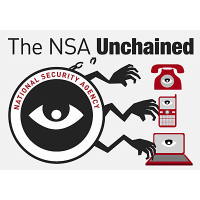Did NSA Eavesdropping on Californian Lead to Deadly Somali Strike?
 (graphic: ACLU)
(graphic: ACLU)
A lawyer for a U.S. citizen living in San Diego and three associates, convicted of supplying funds to a Somali militant group, asked for a new trial last month based on new information that the National Security Agency (NSA) illegally monitored his phone calls.
The government relied upon national security claims to suppress evidence and convict Basaaly Moalin in February, along with three other Somali immigrants, of funneling $8,500 to al-Shabaab in 2007 and 2008. That evidence, it turned out, was obtained via the type of mass phone surveillance of U.S. citizens that former NSA contractor Eric Snowden made known after the trial, and which the government acknowledged in July.
Documents that hadn’t been available suddenly were available and one of those documents was a cryptic government e-mail that seemed to indicate a desire to obtain “real time” coordinates of the man at the other end of a Moalin conversation—al-Shabaab leader Aden Hashi Ayrow, who was killed in a May 2008 U.S. missile strike.
Moalin’s lawyer submitted to the U.S District Court for the Southern District of California an FBI e-mail which read: “We just heard from another agency that Ayrow tried to make a call to Basaaly today, but the call didn't go through. If you see anything today, can you give us a shout? We're extremely interested in getting real time info (location/new #s) on Ayrow,” the e-mail says.
An unnamed defense lawyer told Mark Hosenball at Reuters that it was unclear whether a warrant was issued for the phone monitoring. The government has cited the Moalin case, since the Snowden revelations, as an example of how effective the NSA’s mass telephone metadata collection program can be. It is the only case in which the government has been loud and proud of its mass phone surveillance.
In July, FBI Deputy Director Sean Joyce told Congress, “In order to find the needle that matched up against that number, we needed the haystack.”
Now, Moalin’s lawyer would like a trial for his clients that considers all the evidence the government is making reference to. That would include information about the secret program Snowden unearthed and the legal foundations for it laid down by the secret Foreign Intelligence Surveillance Court.
Back in August, Senator Mark Udall (D-Colorado), a member of the Senate Intelligence Committee who has been critical of the spying, said, “There’s no reason why NSA needed to have its own database containing the phone records of millions of innocent Americans in order to get the information related to Moalin. It could have just as easily gone directly to the phone companies with an individualized court order.”
A hearing on the request for a new trial is scheduled for November. If the hearing is denied, the four Somali men face immediate sentences of up to 20 years.
–Ken Broder
To Learn More:
Lawyers Say NSA Eavesdropping on U.S. Citizen May Have Led to Strike (by Mark Hosenball, Reuters)
The Dragnet’s Day in Court (by Sean Vitka, Slate)
NSA Spying May Give Somali Men New Trial (by Greg Moran, U-T San Diego)
If By “Plots on the Homeland” You Mean “Defense against US-Backed Invaders” (by Marcy Wheeler, EmptyWheel)
Obama Administration Uses 5-Year-Old Wire Transfer of $8,500 to Justify Phone Call Data Surveillance (by Matt Bewig, AllGov)
- Top Stories
- Controversies
- Where is the Money Going?
- California and the Nation
- Appointments and Resignations
- Unusual News
- Latest News
- California Forbids U.S. Immigration Agents from Pretending to be Police
- California Lawmakers Urged to Strip “Self-Dealing” Tax Board of Its Duties
- Big Oil’s Grip on California
- Santa Cruz Police See Homeland Security Betrayal in Use of Gang Roundup as Cover for Immigration Raid
- Oil Companies Face Deadline to Stop Polluting California Groundwater





